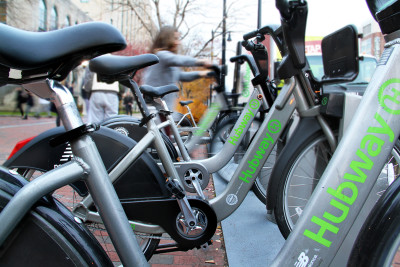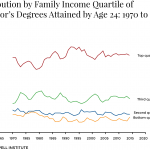
Despite bike-share company Hubway’s plans to expand this winter, the four Hubway stations on the Boston University Charles River Campus and one to be installed on the BU Medical Campus will not operate past Dec. 31.
Hubway, the Boston-based bike-sharing system, announced earlier this month that it is expanding its winter operations with over 110 stations in and around Boston open through the end of the month, including 37 Cambridge stations open year-round, according to a Dec. 1 release announcing the expansion plans.
The stations on the BU CRC are located in Kenmore Square on Commonwealth Avenue, at BU Central at 725 Commonwealth Ave., outside Agganis Arena at 925 Commonwealth Ave. and at Buswell Street and Park Drive in South Campus.
Benjy Kantor, a senior marketing manager for Motivate, Hubway’s operating company, said though membership continues to grow, keeping stations open for winter is a tricky cooperation, with the municipality covering extra costs.
“The system was designed when it first launched in Boston to be three seasons only,” he said. “But two years ago, the City of Cambridge coordinated for its 26 stations to remain open through the year. They covered that cost as a social service, and it is possible that they may have operated at a loss.”
Despite the complexity of cost and hardware associated with winter operation, Kantor said, cities have been moving toward expanding their services during winter.
“This is the largest winter operation we have ever had,” he said. “There are more year-round Cambridge stations and almost all of the Boston sidewalk locations are going to be open through the end of the calendar year, though not necessarily until February or March.”
Kantor said the growing municipal support for Hubway’s year-round operations is part of a larger move to make bikes a part of the regular commute for residents in and around Boston’s metro area.
“All the [municipalities] consider Hubway to be a legitimate option for commuting year round, or they want it to be,” he said. “ … I know some of the municipalities are considering and expecting expansion in the 2016 season.”
The company was launched in 2011 in Boston, Brookline, Cambridge and Somerville, according to Hubway’s website. By July, 2013, Hubway customers made more than 1,000,000 rides, the website stated.
Boston Mayor Martin Walsh announced Hubway’s expansion in October as 15 new stations were installed in areas of Boston including Charlestown, Dorchester and Roxbury.
In November 2014, Hubway had 140 stations and customers took 1,192,000 trips throughout the year, Kantor said. This November, there were 155 stations and almost 1,100,000 rides were taken in 2015, he added.
“We see big jumps in sale of passes or memberships when we install new stations,” he said. “Our largest user group is commuters, anyone trying to get to work or class and the municipalities are trying to accommodate them. This winter, another 10 to 15 options will be open.”
David Miller, a senior in the College of Engineering and president of BU Bikes, said Hubway provides students with bikes and not much else.
“It’s great to have Hubway stations on campus, I see people using them all the time,” he said. “But the winter is so terrible and conditions are so bad that biking isn’t an option.”
Riders who use Hubway likely do not own bikes and might not have much experience, Miller said. They might find urban biking challenging, he said, especially as road conditions deteriorate in the winter.
“My only concern with these programs in general is that people ride them without having any real education on urban riding,” Miller said. “They are not prepared for how different it is from suburban biking, and the winter causes a lot of problems.”
Despite Hubway’s expansion and growing number of stations open in the winter, sometimes biking isn’t an option at all in the Boston snow, Miller said.
“The conditions in the winter are awful, he said. “The bike lane is essentially gone in the winter, and the conditions on the main part of the road are terrible, so your main transportation options are walking or public transportation because biking becomes impossible.”
Several members of the BU community said biking is a reliable way of commuting during the year, but after December, they will seek other transportation methods.
Brian Hart, a first-year graduate student in the Graduate School of Arts and Sciences, said the winter usually disrupts all means of commuting, and at some point, biking will not be feasible.
“I work full-time and am a part-time student, so I need to bike so I can get back and forth to classes on time,” he said. “This will be my first winter in Boston, but I know the buses and trains are often slow then, so I will be biking as much as I can for as long into the winter as I can.”
Pablo Ruiz, a professor in the College of Engineering who uses Hubway, said he wouldn’t use Hubway in bad weather even if the stations stay open.
“I live in Cambridge, so I have stations open near me year-round,” he said. “I have used Hubway as much as I can into the beginning of the winter, but once the weather gets bad it’s a challenge to use Hubway. I usually take the bus when it’s snowing or raining. I don’t use Hubway if there is ice and bad weather, because I wouldn’t be using a bike anyway.”
Calvin Baldwin, a first-year graduate student in the College of Engineering, said his long bike commute would not continue long into 2016.
“I use my own bike to get to classes from where I live in South Boston,” he said. “I’ll be good through December, I know it really hits in February so I’ll have to start waiting for and taking the T a lot more once biking isn’t an option.”
CORRECTION:A previous version of this article read that Benjy Kantor of Hubway’s operating company Motivate said, “As in it is possible they can operate at a loss” instead of “And it is possible that they may have operated at a loss,” and misrepresented Hubway’s statistic. There was more than 77,000 trips in the year 2014 and 90,000 rides in 2015. The article has been updated to reflect this change.




